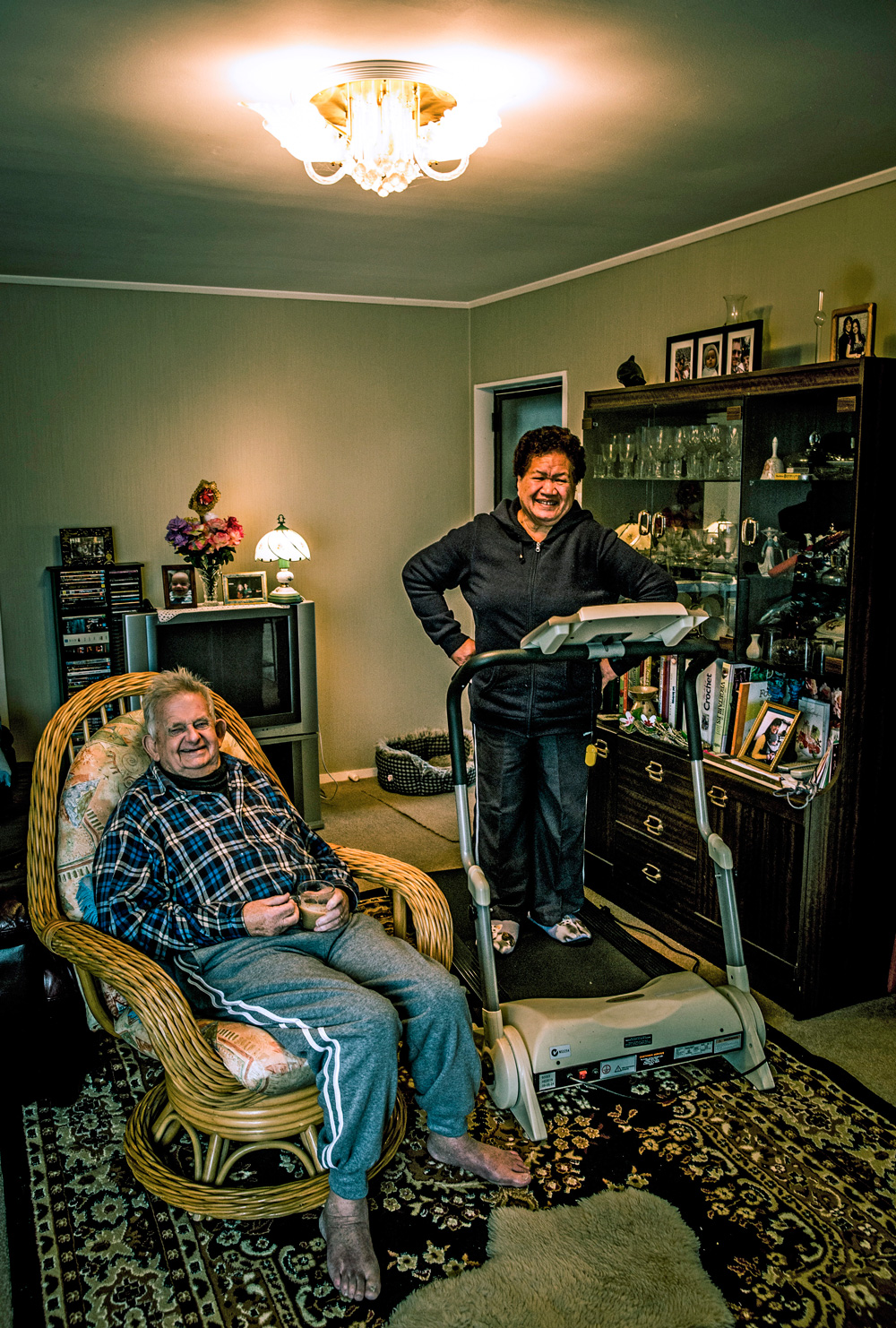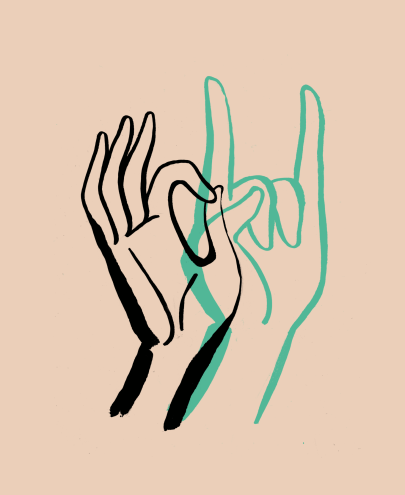Oct 30, 2015 People
This article was first published in the October 2015 issue of Metro. Photos: Vicki Leopold.
Walking in sunshine
WEST: NA AND PETER BRADFORD
When Na Bradford retired, she bought a treadmill to keep herself fit. She and her husband Peter live in Te Atatu Peninsula, in a quiet cul-de-sac, but their house is small and the treadmill had become a problem. So she stuck up an ad at Countdown Te Atatu, offering it, a cane armchair and a printer, next to Kelly selling “a houseload of things”, Gina selling kombucha starter (and instructions) and Gordon offering English lessons.
And yes, the treadmill is a large and heavy beast, I see as soon as Na greets me. It is folded up and crammed into her conservatory, which is also filled with her exercise bike, her Singer sewing machine, the cat feeder, the vacuum cleaner, pink hand weights, and a table covered with the wool she crochets into squares to be made into blankets to send to the needy.
Na explains she’s selling the treadmill, even though she paid $500 for it, because she’s discovered Zumba at The Fono, which co-ordinates fitness, exercise and nutrition services for Pacific people in West Auckland. She has been passionately attending as many classes as she can since she retired at 70, and has lost 4kg. She is going today at 1pm, actually.
“Kelston, Monday, Tuesday — free. And then the Hub in Henderson, Wednesday. And then back over here at Te Atatu Peninsula, Thursday. And then Saturday morning, Te Atatu South. They’re all free!”
She is 74, she confides, but she looks about 50.
“A lot of people tell me that,” she beams. “When I got retired, they wanted me to go back and do part time and I said, ‘No! I’ve finished.’ And then, ‘What am I going to do?’ — this is me, talking to myself. I did all the gardening, the vege garden, and everything else outside, flower garden, that’s done. What am I going to do?”
So she looked in the paper and found The Fono and new friends, and her attachment to the treadmill, taking up a precious corner of her sunny conservatory, began to wane. What car do I have to take it away, she asks.
I’m driving this Nissan Sunny, I say, but actually, haha, I say, here’s the thing, I’m writing a magazine article on those supermarket ads, not actually looking for a treadmill to buy for myself, haha, but Na says: “I’ll drop it down to $120. As long as it’s out of my way!”
What about the printer and the chair? Do I want those? The printer’s brand new! She and Peter bring me inside to sit down in the chair and try it. I give an experimental rock. “It’s a nice chair but it’s a pain in the bum,” Peter says.
He’s retired, too, from long-haul truck driving. He’s 78 now, but was just about 40 when he and Na met at the Orange dance hall on Newton Rd. They liked the look of each other, quick-stepping across that springy tawa floor.
“She hasn’t thrown me out since,” Peter says. “What we’ve got, we share with each other,” Na says. “That’s how it should work.” Though Na is always out of the house, with all her exercise classes.
“We’ll get rid of that. And that. And that,” Na says gleefully, pointing around the lounge.
“She bought the walker first and then Fono come into the racket and that was the end of the walker,” Peter says. “And it just stood there for two years and I said it has to go.”
“We’ll get rid of that. And that. And that,” Na says gleefully, pointing around the lounge. “Now I’ve got room.”
“Now you can get rid of me,” Peter says, and then returns to me:
“How are you going to get that walker?”
“I’ve got a Nissan Sunny,” I say.
“It won’t fit in there, darling,” he says.
Maybe I could put the seat down, I venture. Well, they had trouble putting it into their Range Rover when they went to get it, he says, brow wrinkled.
“Do you know anyone with a van, dear?”
“Well, I’m only in Auckland for a little while,” I say. “I live in Nelson.”
“Oh,” Na, says, “You’re a country girl! Good on you!”
The phone rings, and Peter answers it.
“Hey, is your trailer empty?” he asks the caller. “Would you like to make a couple of dollars? A lady in here talking to Mum has just bought the big walker and she only has a Nissan car and it ain’t gonna fit in there. Here, you have a talk to him,” he says, handing me the phone.
They’ll throw in the printer too, they say, and explain that I’ll need an Allen key to dismantle the walker and that it has variable speeds should I want to start running. Also, am I sure I don’t want the chair? It’s a comfy chair. I probably couldn’t, I apologise, though it is a very comfy chair. I hand over $120. The walker and the printer are mine.
Parrot fashion love
EAST: CHRISTINE AND POLLY
It was a wild night in St Heliers the day Cyclone Pam arrived, and Christine remembers the wind buffeting the trees and the heavy thrash of rain. The next afternoon, when she returned home to her brick unit on a quiet road not far from Dingle Dell Reserve, she spotted a flash of yellow leaving her lawn and alighting on her neighbour’s.
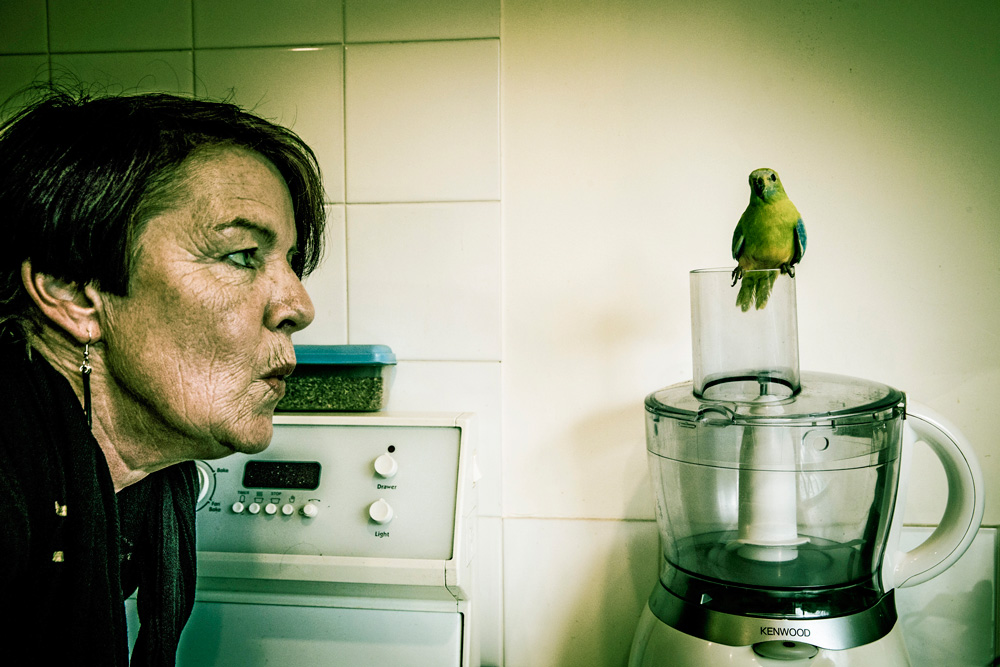
It was a small golden bird, and she was astonished that it had managed to escape the night, not to mention the unusual concentration of neighbourhood cats. The bird must have been out the entire night, blown through the trees on the wing. Someone, maybe not too far away, had lost their pet.
She called out to her neighbour and the pair of them managed to catch it, popping it into a handy cat cage. Christine brought it inside, and gave it half a wild seed bell left over from when her nephew’s son was visiting and she’d hung it on the fence so he could watch birds. “And she just ate and ate and ate and ate,” she says. She called her, naturally, Polly.
Polly was beautiful, with sunrise colouring — a rich egg-yolk orange belly, fading through yellow to a golden green on her breast, with touches of pale blue around the face and wing. Christine started trying to find her owners. That day, she wrote out a card at Meadowbank Countdown in St Johns Rd and popped it in the lower left of the jam-packed board, beneath the massage and handymen and Gordon offering a man with a van.
“Found: Small Parakeet. St Heliers on Sunday 15/3.”
She advertised on Neighbourly, rang five vets, called pet shops, made up 50 flyers to drop in letterboxes, and posted on lost-pets websites. She didn’t find an owner, but she did find a cage, and also that Polly was a mutant turquoisine parakeet.
“People told me if a bird escapes, people give up straight away because they think there’s no food, there’s lots of predators and it won’t last,” she says. “So they don’t even look for ads. They just assume it would have been eaten.”
Two months later, Polly was still in her lounge, and Christine had discovered that she liked kale, parsley and carrot tops, and she’d peep softly when she was happy or when Christine put food down.
“But she gets angry,” Christine says. “Sometimes she’ll see a big bird out on the lawn and she’ll give five short, sharp sounds.”
Christine is a wild-bird watcher, normally. She has pictures of fantails and godwits on her walls, and watches the godwits arrive at the Miranda Shorebird Centre on the Firth of Thames, and she volunteers at Tiritiri Matangi, the bird sanctuary in the Hauraki Gulf. After a couple of weeks, when Polly started to run up and down on her perch, Christine couldn’t stand it any longer. She took her into the hallway and opened the cage door.
Polly was unsure sometimes about how to be a bird. She needed company.
“And she just flew and flew and flew and flew,” she says. And so it became a morning routine for the pair of them. Christine had an eyelet still screwed into the hallway from when she had shoulder surgery and used a pulley to do her mobilising exercises, so she strung up a zigzagging cord and a piece of dowelling.
Every morning, Polly ran up and down on her perch in her cage, and Christine laid down sheets, then put the cage on a chair and opened the door. Polly would hop out, fly around and perch on the door handle, and then politely hop back in the cage when she was done.
“She has a very sweet nature,” Christine says.
But Christine began to fret about her mental health, suspecting that she was quite young; Polly was unsure sometimes about how to be a bird. She needed company, and other birds to teach her. When Christine went out, Polly was alone in the cage, chirping alarm at the large birds on the lawn.
“You know, I go down to the Miranda Shorebird Centre and they show slides of 2500 birds all flying around and here’s me,” Christine says, “my whole life around this tiny little one.”
She kept her for another two months until she found Polly a home at the Butterfly Creek attraction at Auckland Airport. It doesn’t usually rehome birds, but an exception was made for Polly. Butterfly Creek found several more yellow parakeets for her to be friends with, and the birds all met in the best traditions, over a feed.
The handlers spread seed on the ground and the birds pecked them up together, the bigger birds — the blue and gold macaws, golden and silver pheasants, African grey parrots, cockatoos — leaving the smaller seeds for the little ones.
By all accounts, Polly is doing fine.
“To be perfectly honest,” Butterfly Creek animal manager Roberto Lapinski says, “it’s not the easiest thing to pick out one bird in 20.” He explains that Polly is in there somewhere, but she’d be hard to find, because she’s just one part of a giant flock of her own kind.
A dogs’ tale
SOUTH: JANET ELLERY
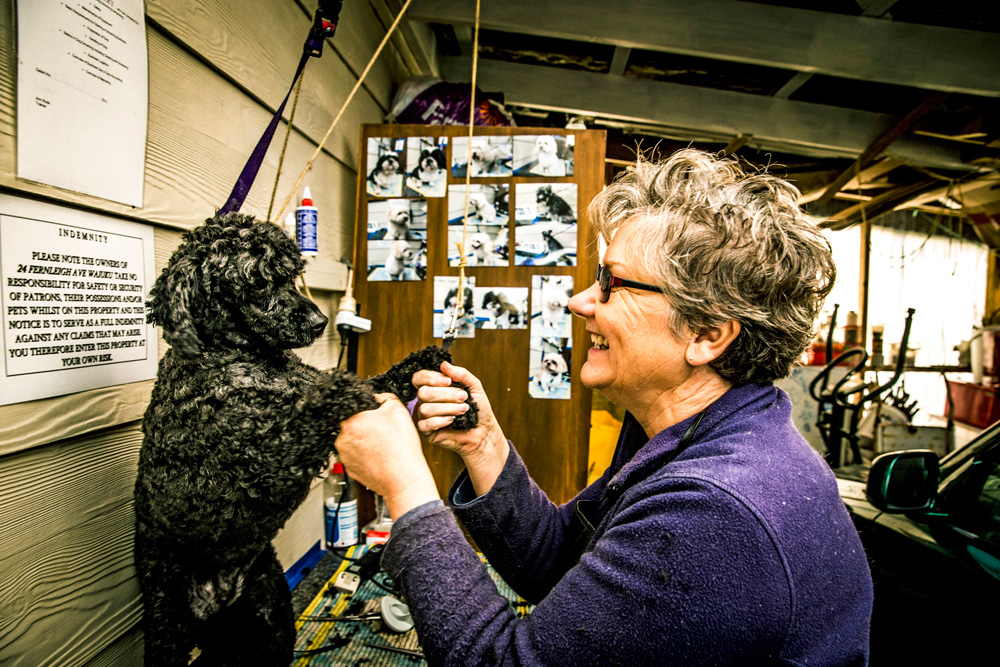
I hear two massive, toothy, slavering, outraged dogs burroo-roo-roo-rooing as I walk up the driveway, to find Janet Ellery, of Best Lil Buddies, grooming a small white dog in the carport attached to her Waiuku house.
She has a few cards up at Countdown Pukekohe and Waiuku New World, next to the lounge suite with rolled arms, a $60 wheelchair (pre-loved, suitable for a small teen or adult up to 60kg), a child’s ad for “Aka Aka School Market Fear” and several other dog groomers. This far south, there is no Gordon, whose ads I have seen in every supermarket in the north, east and west offering English lessons, a removal van or to do any work wanted, and, lately, making a plea for storage space.
Janet tried advertising in the local paper, but it was too expensive and she wasn’t getting anybody ringing up. The supermarket works well. “It’s amazing the number of people who read those notices,” she says.
She clips dogs for from $30, ears and nails included, and gives them a full groom for $40, which takes about an hour and a half. In the carport, she’s set up a special bench, ceiling ties for the unruly ones, her clippers, a sink, shampoos.
As I arrive, I see the massive, toothy, slavering, outraged dogs turn out to be Poppy and her pup Peppy: small, white, pretty, and merely indignant bichon-maltese-Chinese crested-shih tzu mixes. They bark from the house and skitter around the fences.
They’re good little watchdogs, Janet says. “You don’t need a great big dog for a watchdog. Just a little radar, little sirens.”
Today, Poppy and Peppy’s matriarch, Willow, is getting the full grooming treatment, her rheumy eyes squinting at the world from under a white fringe. She’s Janet’s aunt’s dog, a trembling, 13-year-old Chinese crested powderpuff who had a hard start to life — Janet’s aunt got her after a relative found her pregnant, kept in a cage in a laundry. The owner, Janet says, couldn’t be bothered.
Willow got run over by a trailer a few years ago, which destroyed her beautiful tail and nearly took her back legs. She had to have major surgery and then rest for six weeks, a torment she bore stoically.
“They’re very intelligent, dogs,” Janet says. “She just knew she had to stay still.”
The hairdryer drones, and Willow pants, eyes half-shut.
Janet, who is quietly spoken and very well groomed herself, was born and bred in Waiuku. “Everybody knew everybody when I was growing up,” she said. “You went to bed at night without locking the door. You don’t do that now.”
“I thought, ‘What am I going to do?’, you know? I spent all my life looking after my kids. I used to take my dog to a groomer, and I was watching her and thinking, ‘I could probably do this.’”
She began her business after her marriage ended. “It was a very scary time,” she says. “I just didn’t know what I was going to do. I didn’t want to go and work in a shop; I’m just not that sort of person. And I’m 59; who would want to employ a 59-year-old when they can get a 49-year-old?
“I thought, ‘What am I going to do?’, you know? I spent all my life looking after my kids. I used to take my dog to a groomer, and I was watching her and thinking, ‘I could probably do this.’”
Janet’s always loved animals. “I’m a big softy,” she says.
Her sister had a dog, too, and they decided to go in together and buy some clippers and give it a go, and Janet thought, yes, I can do this.
Two years ago, she took a course at the Auckland Dog Grooming Training Centre, which offered lessons on Grooming for Pleasure and Grooming for Profit, and here she is.
She’s saving for a better set-up — most dog groomers have a proper room — but doesn’t have the finances yet. One day. When she gets a bit more known. In the meantime, she’s enjoying her new profession.
“You’ve got to look outside the square,” she says. “I’ve been looking for something all my life that I enjoy doing, apart from looking after the kids. I had five of them, so I was pretty busy.”
She has a book she refers to, to check what shape to make each dog’s fur, but much of it is seeing what they suit, what their face looks like, what breeds are in them.
Now she’s using thinning scissors to trim out some of Willow’s white fluff. No square dog faces or coloured tails, then.
“I wouldn’t put a dog through that,” she says. “The poor things.”
It’s a soothing job — the long passes of the clippers, the attention to the tiny nails — unless you get an unruly one. And the best part about grooming is delivering her charges to their owners, who, when they see their fresh new love, go into paroxysms of joy.
Janet allows a wide smile when she talks about it. “‘Ohhhh! Aren’t you lovely! Oh! Look at you all clean!’ “It’s nice to see.”
The garage guy
NORTH: GORDON WRIGLEY
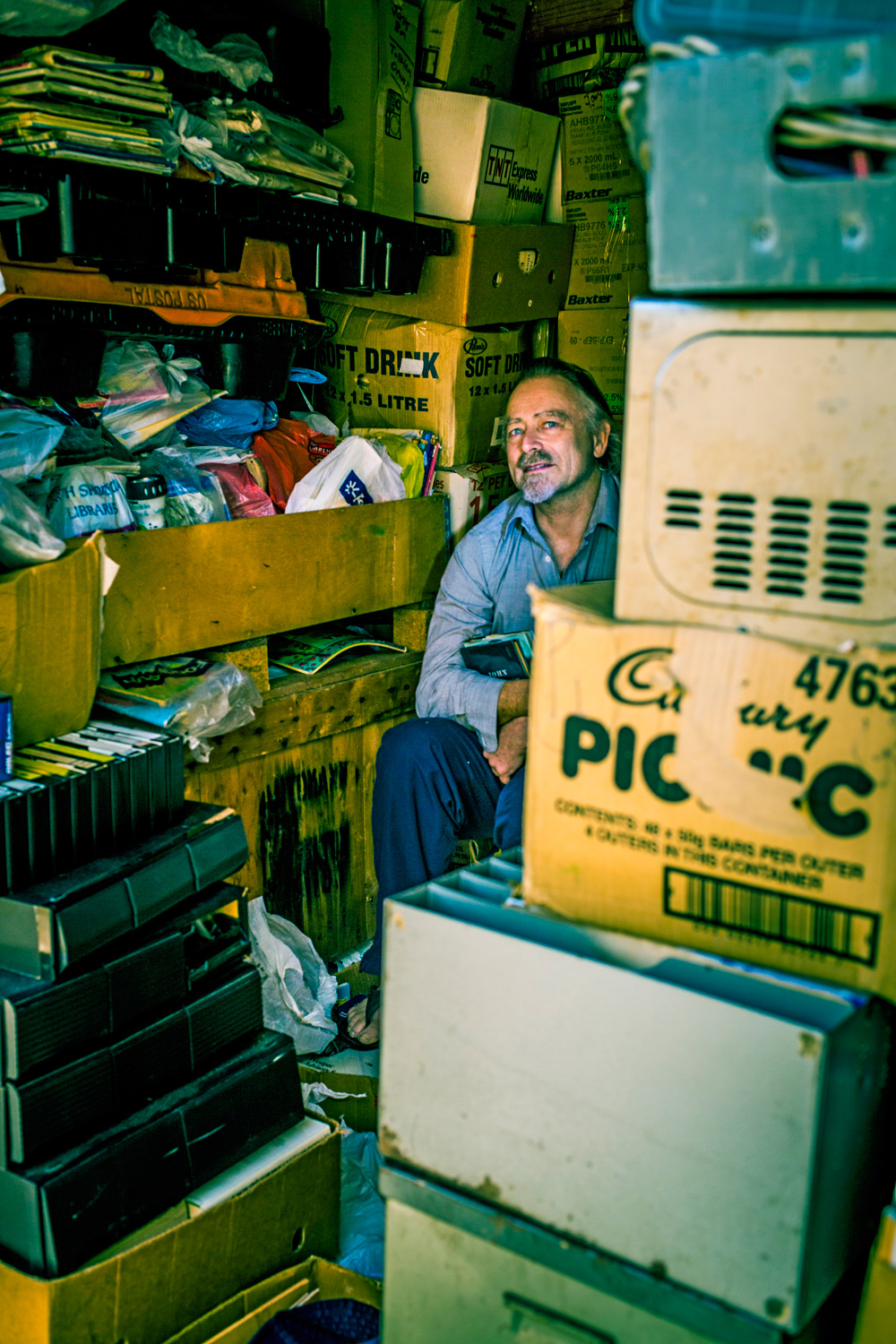
I have been tracking Gordon around supermarkets all over Auckland. I first saw his cards shouting from the boards at New World Victoria Park: “MAN WITH A VAN” in giant blue marker. “$40 AN HOUR.”
Another read, “RAINY DAY WORK WANTED.”
Another: “ENGLISH TEACHING.”
He also needed storage space and a place to run two fridge-freezers. His cards, in different colours, were up in supermarkets in Hauraki, Glen Eden, Devonport, Northcote, Milford, Sunnynook, Browns Bay, Glenfield and Takapuna.
I meet Gordon at the Postman’s Leg in Glenfield, and he explained that he’d been tutoring English for 20 years, but work had dried up with the Global Financial Crisis and he’s had to do other work to make ends meet. Things got difficult three years ago, after he was evicted. He broke up with his wife a while back, and had been living in a big house for eight years, but had trouble paying the rent after an income miscalculation while working as a courier driver.
He’s had to move six times in three years, actually, and still has a fair bit of stuff but is slowly working it down, but it hurts, because you never know when it’s going to come in handy. Last year, he got rid of one big garage full of stuff, the most expensive one, but…
Wait a minute. What stuff? How many storage garages does he have?
“I did have four, but I’ve now got three commercial garages, plus a smaller private one,” he says. He smiles. He smiles a lot, a gentle, quiet smile, says “hmmm” before he answers.
Two of the garages he’s never seen the back of in three years, because people helping him move filled them with stuff before he got there — and they unfortunately put the medium-sized stuff at the back, which was a shame, because some of that stuff was stuff he needed and he’s now had to re-buy it.
“Locked in there and I haven’t seen them since,” he says. Stuff like rechargeable batteries. “And a labeller, which would have helped me to organise things.”
The garages have been taking most of his income. “But it’s down a little in absolute terms, as a proportion,” he says. “I was spending about $1000 a month.” Now it’s probably between $600 and $700.
A pair of walkie-talkies whose batteries don’t work, but he and his son used to play with them. A 1980 IBM PC he bought secondhand in 1990 for $700, which has information he wants to retrieve one day. Books arranged according to the Dewey system. One of the garages, the biggest one, is completely blocked by a couple of filing cabinets.
“What’s in them?” I ask.
“Nothing,” he says. “Well that’s not quite true actually. One of them has nothing.”
He came to Auckland from Palmerston North in 1984, when he was 26, with two suitcases. “I came literally with what I could carry,” he says. “Part of the reason I guess that I hold on to things now is I regretted some of the things I let go then.”
Gordon was on TV series Renters a while back, which was, um, about the problems property management agencies have with tenants.
“I think there was someone in the firm who was specifically anti-book.”
He’d like to keep his stuff, but the main pressure comes from the money. Though some of it comes from “the people who use the H word”.
What H word?
“Hoarder.”
Later, I look up Renters on TVNZ OnDemand, and there’s poor Gordon, series 4, episode 2, described as “an unusual tenant who’s well on his way to becoming an ex-tenant”.
“He’s a hoarder,” the property manager, Judy, says sternly as she drives to his house. “He doesn’t seem to think he is a hoarder.”
Gordon’s stuff fills a house and a three-car garage. Judy gingerly steps through an unholy towering mess in the basement and sighs.
“Why is the man collecting firewood when he doesn’t have a fire?” she asks, and I begin to feel sorry for Gordon.
“Why is he collecting broken polystyrene? Why is he collecting bags of twigs? It’s beyond me.” In 24 years on the job, she has never had an issue like this.
“Bag of wood shavings,” she says, scanning the inorganic collection on the kerb, then reads a label. “Oh. It’s bedding for rats and mice.”
I begin to feel sorry for Judy.
Gordon tells the show’s narrator not to worry; there are systems in place. “I reckon altogether I own about 15,000 books,” he says, “and probably a third of them are at this location.” Of his time spent with Judy, he says, simply: “This has been the second-worst relationship of my life.”
“I mean, why do you keep tomato sauce bottles, for God’s sake?” Judy asks. But that’s a rhetorical question, surely? It’s because you never know when they may come in handy.

